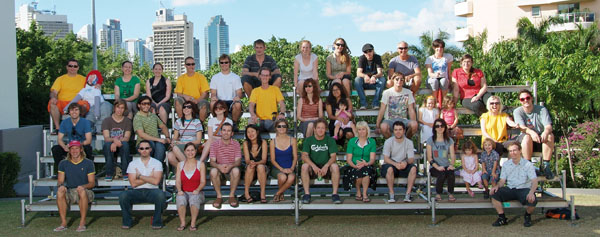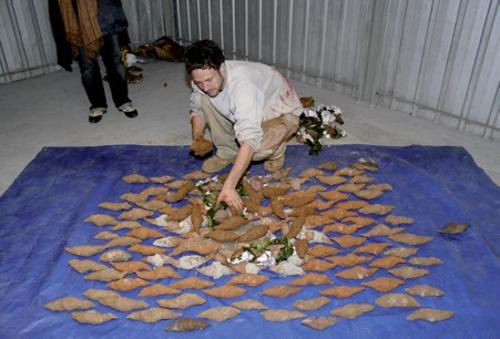
The latest exhibition at the DELL Gallery in Brisbane, 'The One and the Many', is a nimble and craftily-devised journey through an increasingly important strand of contemporary conceptual art.
The curators bring together a group of mainly young artists whose work collectively can be said to draw on the 'relational aesthetics' movement (a term coined by Nicholas Bourriaud in his 1998 book of the same name) made prominent by artists such as Vanessa Beecroft, Gillian Wearing, Douglas Gordon and Maurizio Cattelan. The result is a surprisingly warm and good-humoured exhibition.
Emil Goh's 'Umbrella Taxi', a perambulatory escort from the street to exhibition door by volunteers with yellow umbrellas, is an excellent example of the beneficent spirit of the show. Goh's work, emerging from an artistic practice plied over the last decade in multiple cities across Asia, is best understood as the next incarnation of Baudelaire's 'flaneur' motif, and the sweaty urban crush of his videos recall Poe's famous miniature of city life, 'The Man in the Crowd.'
Australian collective The General Will also take a leisurely and good-willed approach to the exhibition, staging not so much a performance as 'an afternoon of leisure, culminating in a group photograph.' The event, a relaxed affair with picnic rugs, eskies of beer and a friend of theirs DJing for guests, was a charming admixture of happening, outdoor party and an attempt at documenting a local art scene.
Hiromi Tango's sprawling installation is by far the friendliest piece in the show, and certainly the cutest. Tango has filled a whole corner of the gallery with her diaries and personal effects, encouraging visitors to take them home and contribute. Lush and decorative, the colourful collage of objects looks almost like a three-dimensional Klimt. At the opening of the exhibition, Tango called Holly Arden on the phone and encouraged patrons to have a chat. It's all evidence of an arresting personal vision that is part 'gift relationship' and part 'jouissance'.
If Hiromi Tango's work is joyous and playful, that of seasoned conceptualist Stuart Ringholt shows a more sombre perspective. A mini-retrospective of sorts, his work in this show collects some of his better known pieces, including his self-published books, 'Funny Fear Workshop' and 'Everything I Own'. Ringholt's superficially neurotic but strangely honest diarisation of his life and its attendant problems – including drug-induced psychosis – runs a real risk of mawkish self-obsession. But Ringholt evades this with a grim, clear-eyed humour suffused with a spirit of humanist sympathy.
Todd McMillan echoes this knowing self-effacement with his witty video one-liner By the sea. Cocking his hat ever so tartly to Caspar David Friedrich (ever a rich source of artistic sampology), this time-lapse video piece speeds through 12 hours on the cliffs at Sydney Heads in barely 72 seconds. The joke is not so much on us as the artist himself, who huddles uncomfortably in the stiff breeze, conspicuously failing to recapture the sublimity of a more romantic artistic period.
Danielle Freakley displays her current project, 'The Quote Generator', which documents her unsettling and often hilarious attempts to communicate in daily life using only quotes from various nuggets of popular culture. A chillingly earnest instantiation of Walter Benjamin's quoted desire to create a book composed only of quotations, the result is rather like a student film-maker's version of a Borges short story: inchoate, chaotic and strangely admirable.
While there are plenty of hits in 'The One and the Many', there are also some misses. Kate Murphy's 'Ponyskate', a shotgun marriage of reality TV and bloated editing, tells us little of the childhood experience but reveals much of the artist's lack of film-making craft. Gabrielle de Vietri's 'Ideas Catalogues' is a rather feeble critique of the issues involved in intellectual property, and seems unlikely to accomplish much genuine intellectual engagement either.












